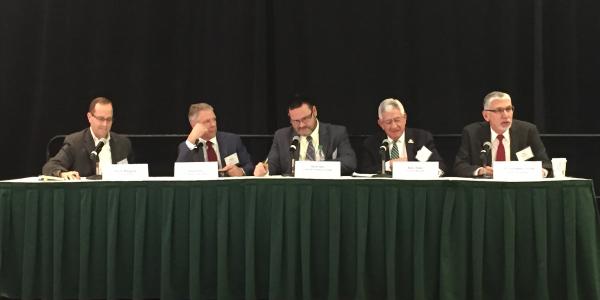Educators and Industry Share Outlooks on Cyber
“The only way our nation is going to succeed in cyber is through public-private partnerships,” stated Major Gen. John B. Morrison, USA, commanding general, Army Cyber Center of Excellence and Fort Gordon, during an informal question and answer session over lunch at AFCEA’s Cyber Education, Research and Training Symposium.
Educators and industry leaders echoed the sentiment during afternoon panels on the second day of the conference.
“Everyone is struggling to keep up,” said Lt. Gen. Rhett Hernandez, USA (Ret.), West Point chair to the Army Cyber Institute and former commander of the U.S Army Cyber Command, who moderated the panel “Cyber Educator Perspective & Priorities.”
The problem is not technology; it’s people. “We need people who are not only out-thinking and out-maneuvering our adversaries, but also out-innovating them,” Gen. Hernandez added.
Robert Quinn, vice president of business development, St. Leo University, said academia is concerned with shortages of cyber talent much like the military and industry. But, he routinely looks to the military for help on shaping applied research, the topics they teach at St. Leo, how they teach them and what approach to the teaching is most effective.
Industry, Quinn says, helps bring academia instructors and funding for programs and research. His concern is direction. He thinks military and industry need to offer more guidance on how to solve the shortage of cyber talent. “What are the particulars you want so we can educate your employees and soldiers, sailors and airmen?” stressed Quinn.
“We can’t be effective in knitting together intellectual property without talking to the military. It’s the only way we can really do our job,” said Rear Adm. Bill Leigher, USN (Ret.), director, Department of Defense Cyber Warfare Programs, Raytheon Intelligence, Information and Services, during the panel “Building the Cyber Workforce–Industry Perspectives.”
Panelist Dr. Matthew McFadden, director, Cyber Service Area, CSRA Inc., reiterated the same concerns for industry that the military and academia have: the never-ending demand for cyber professionals; training and education; getting tools and capabilities out to cyber professionals; being agile in a technology landscape that is constantly changing; and having processes in place to take threats and develop lessons learned.
Speakers and panelists throughout the symposium agreed the military is good at teamwork, planning and leadership, and finding the right industry and academic entities to partner with to execute missions is critical. Learning from each other will be key to collective success.





Comments